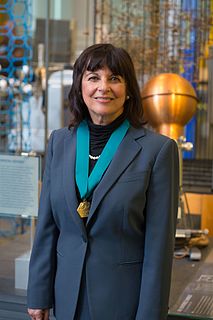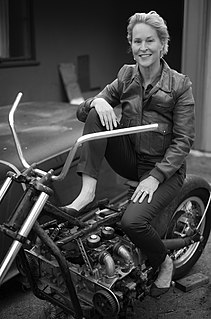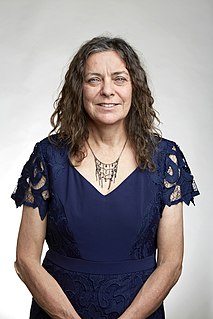Related Research Articles

Jacqueline K. Barton, is an American chemist. She worked as a Professor of Chemistry at Hunter College (1980–82), and at Columbia University (1983–89) before joining the California Institute of Technology. In 1997 she became the Arthur and Marian Hanisch Memorial Professor of Chemistry and from 2009 to 2019, the Norman Davidson Leadership Chair of the Division of Chemistry and Chemical Engineering at Caltech. She currently is the John G. Kirkwood and Arthur A. Noyes Professor of Chemistry.

Geobiology is a field of scientific research that explores the interactions between the physical Earth and the biosphere. It is a relatively young field, and its borders are fluid. There is considerable overlap with the fields of ecology, evolutionary biology, microbiology, paleontology, and particularly soil science and biogeochemistry. Geobiology applies the principles and methods of biology, geology, and soil science to the study of the ancient history of the co-evolution of life and Earth as well as the role of life in the modern world. Geobiologic studies tend to be focused on microorganisms, and on the role that life plays in altering the chemical and physical environment of the pedosphere, which exists at the intersection of the lithosphere, atmosphere, hydrosphere and/or cryosphere. It differs from biogeochemistry in that the focus is on processes and organisms over space and time rather than on global chemical cycles.
John Norman Abelson is an American molecular biologist with expertise in biophysics, biochemistry, and genetics. He was a professor at the California Institute of Technology (Caltech).

The College of Biological Sciences (CBS) is one of seven freshman-admitting colleges at the University of Minnesota. Established in 1869 as the College of Sciences, the College of Biological Sciences is now located on both the Minneapolis Campus and the St. Paul Campus. CBS is a college that focuses its undergraduate and graduate attention towards research. The dean is Valery E. Forbes. The Associate Dean for Graduate Education is Carrie Wilmot, the Associate Dean for Undergraduate Education is John Ward, the Associate Dean for Research is David Greenstein, and the Associate Dean for Faculty is Marlene Zuk.

Frances Hamilton Arnold is an American chemical engineer and Nobel Laureate. She is the Linus Pauling Professor of Chemical Engineering, Bioengineering and Biochemistry at the California Institute of Technology (Caltech). In 2018, she was awarded the Nobel Prize in Chemistry for pioneering the use of directed evolution to engineer enzymes.
Roberto Kolter is Professor of Microbiology, Emeritus at Harvard Medical School, an author, and past president of the American Society for Microbiology. Kolter has been a professor at Harvard Medical School since 1983 and was Co-director of Harvard's Microbial Sciences Initiative from 2003-2018. During the 35-year term of the Kolter laboratory from 1983 to 2018, more than 130 graduate student and postdoctoral trainees explored an eclectic mix of topics gravitating around the study of microbes. Kolter is a fellow of the American Association for the Advancement of Science and of the American Academy of Microbiology.

Jillian Fiona Banfield is Professor at the University of California, Berkeley with appointments in the Earth Science, Ecosystem Science and Materials Science and Engineering departments. She leads the Microbial Research initiative within the Innovative Genomics Institute, is affiliated with Lawrence Berkeley National Laboratory and has a position at the University of Melbourne, Australia. Some of her most noted work includes publications on the structure and functioning of microbial communities and the nature, properties and reactivity of nanomaterials.
Kristi S. Anseth is the Tisone Distinguished Professor of Chemical and Biological Engineering, an Associate Professor of Surgery, and a Howard Hughes Medical Investigator at the University of Colorado at Boulder. Her main research interests are the design of synthetic biomaterials using hydrogels, tissue engineering, and regenerative medicine.
Laura Lee Kiessling is an American chemist and the Novartis Professor of Chemistry at the Massachusetts Institute of Technology. Kiessling's research focuses on elucidating and exploiting interactions on the cell surface, especially those mediated by proteins binding to carbohydrates. Multivalent protein-carbohydrate interactions play roles in cell-cell recognition and signal transduction. Understanding and manipulating these interactions provides tools to study biological processes and design therapeutic treatments. Kiessling's interdisciplinary research combines organic synthesis, polymer chemistry, structural biology, and molecular and cell biology.
David A. Tirrell is an American chemist and the Ross McCollum-William H. Corcoran Professor and Professor of Chemistry and Chemical Engineering at the California Institute of Technology (Caltech). A pioneer in the areas of polymer synthesis and protein biosynthesis, his research has a wide range of applications, including coatings, adhesion, lubrication, bioengineering and biomedical intervention. From 2012 to 2018, Tirrell was the Director of the Beckman Institute at Caltech. As of 2017, he serves as Caltech's Provost. He is one of very few American scientists to have been elected to all three branches of the United States National Academies: the National Academy of Science (2006), the National Academy of Engineering (2008), and the Institute of Medicine (2011). He was elected a Member of the American Philosophical Society in 2019.

Jennifer Anne Doudna is an American biochemist who has done pioneering work in CRISPR gene editing, and made other fundamental contributions in biochemistry and genetics. She received the 2020 Nobel Prize in Chemistry, with Emmanuelle Charpentier, "for the development of a method for genome editing." She is the Li Ka Shing Chancellor's Chair Professor in the Department of Chemistry and the Department of Molecular and Cell Biology at the University of California, Berkeley. She has been an investigator with the Howard Hughes Medical Institute since 1997.
Roger Everett Summons is the Schlumberger Professor of Geobiology at the Massachusetts Institute of Technology and Professor of Geobiology in the Department of Earth, Atmospheric and Planetary Sciences.
Katrina Jane Edwards was a pioneering geomicrobiologist known for her studies of organisms living below the ocean floor, specifically exploring the interactions between the microbes and their geological surroundings, and how global processes were influenced by these interactions. She spearheaded the Center for Dark Energy Biosphere Investigation (C-DEBI) project at the University of Southern California, which is ongoing. Edwards also helped organize the deep biosphere research community by heading the Fe-Oxidizing Microbial Observatory Project on Loihi Seamount, and serving on several program steering committees involving ocean drilling. Edwards taught at the Woods Hole Oceanographic Institution (WHOI) and later became a professor at the University of Southern California.[1][2]
Kartik Chandran is an American environmental engineer at Columbia University, where he is a Professor in the Department of Earth and Environmental Engineering. He primarily works on the interface between environmental molecular and microbiology, environmental biotechnology and environmental engineering. The focus of his research is on elucidating the molecular microbial ecology and metabolic pathways of the microbial nitrogen cycle. Applications of his work have ranged from energy and resource efficient treatment of nitrogen containing wastewater streams, development and implementation of sustainable approaches to sanitation to novel models for resource recovery. Under his stewardship, the directions of biological wastewater treatment and biological nutrient removal were established for the first ever time in the history of Columbia University.

Bruce E. Rittmann is Regents' Professor of Environmental Engineering and Director of the Swette Center for Environmental Biotechnology at the Biodesign Institute of Arizona State University. He was also elected a member of the National Academy of Engineering in 2004 for pioneering the development of biofilm fundamentals and contributing to their widespread use in the cleanup of contaminated waters, soils, and ecosystems.
Victoria J. Orphan is a geobiologist at the California Institute of Technology who studies the interactions between marine microorganisms and their environment. As of 2020, she is the Chair for the Center of Environmental Microbial Interactions.
Greg N. Stephanopoulos is an American chemical engineer and the Willard Henry Dow Professor in the Department of Chemical Engineering at the Massachusetts Institute of Technology. He has worked at MIT, Caltech, and the University of Minnesota in the areas of biotechnology, bioinformatics, and metabolic engineering especially in the areas of bioprocessing for biochemical and biofuel production. Stephanopoulos is the author of over 400 scientific publications with more than 35,000 citations as of April 2018. In addition, Greg has supervised more than 70 graduate students and 50 post-docs whose research has led to more than 50 patents. He was elected a fellow of the American Association for the Advancement of Science (2005), a member of the National Academy of Engineering (2003), and received the ENI Prize on Renewable Energy 2011.

Dawn Yvonne Sumner is an American geologist, planetary scientist, and astrobiologist. She is a professor at the University of California, Davis. Sumner's research includes evaluating microbial communities in Antarctic lakes, exploration of Mars via the Curiosity rover, and characterization of microbial communities in the lab and from ancient geologic samples. She is an investigator on the NASA Mars Science Laboratory (MSL) and was Chair of the UC Davis Department of Earth & Planetary Sciences from 2014-2016. She is Fellow of the Geological Society of America.
Tanja Bosak is a Croatian-American experimental geobiologist who is currently an associate professor in the Earth, Atmosphere, and Planetary Science department at the Massachusetts Institute of Technology. Her awards include the Subaru Outstanding Woman in Science Award from the Geological Society of America (2007), the James B. Macelwane Medal from the American Geophysical Union (2011), and was elected an AGU fellow (2011). Bosak is recognized for her work understanding stromatolite genesis, in addition to her work in broader geobiology and geochemistry.
References
- ↑ "Geobiologist Honored by National Academy of Sciences". Caltech. Retrieved 16 October 2018.
- ↑ "Dianne Newman (Caltech) Part 1: An Overview of Microbial Diversity and Evolution". YouTube. Retrieved 17 October 2018.
- 1 2 3 4 "Dianne K. Newman". Caltech. Retrieved 16 October 2018.
- 1 2 "Academy Honors Six for Major Contributions in Biological, Medical, and Agricultural Sciences". The National Academies of Sciences, Engineering, and Medicine. Retrieved 17 October 2018.
- 1 2 "Dianne Newman". MacArthur Foundation. Retrieved 17 October 2018.
- 1 2 Galvin, Molly (April 30, 2019). "National Academy of Sciences Elects Members and Foreign Associates; Historic Number of Women Elected to Its Membership". News from the National Academy of Sciences. National Academy of Sciences.
- ↑ Pandika, Melissa (October 30, 2016). "This Macarthur Genius Has Found a Connection between Geology and Genetics". OZY.
- ↑ Coughlin, Kevin (June 11, 1987). "People". The Washington Post.
Diane Newman of West Potomac High School won second place in physics, and Kenneth Hung of McLean High School won third place in engineering at the 38th International Science and Engineering Fair last month in Puerto Rico.
- ↑ "People | Morel Trace Metals Group". morel.princeton.edu. Retrieved 2016-12-15.
- ↑ "The Kolter Lab | Former Members". gasp.med.harvard.edu. Retrieved 2019-08-01.
- ↑ "Innovators Under 35: Dianne Newman". MIT Technology Review. 1999.
- ↑ Nadia Dreid, "15 Academics Are Among 23 Winners of 2016 MacArthur Fellowships" Chronicle of Higher Education Sept. 22, 2016. Accessed Oct. 14, 2016.
- ↑ "Welcome to the Newman Lab". Caltech. Retrieved 17 October 2018.
- ↑ https://harveysociety.org/lectures/index.php?series=114